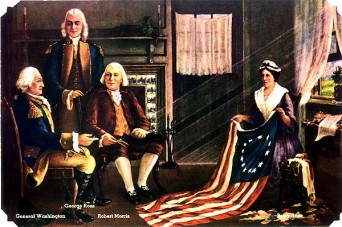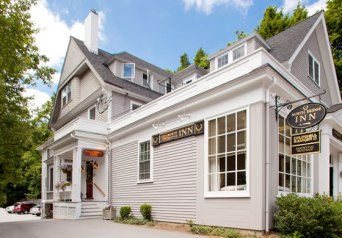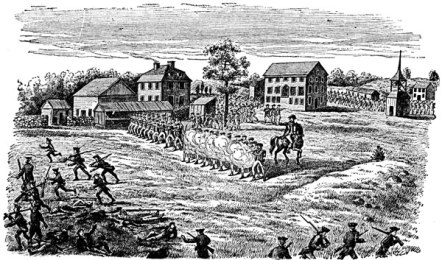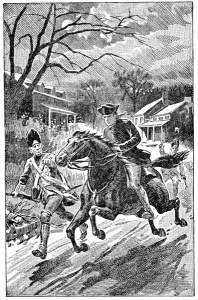We return to Philadelphia, Pennsylvania for a very important stop! On the last stage of our virtual tour we remembered the pivotal battle at Trenton, New Jersey. We contemplated the inspiring words of George Washington as he motivated his exhausted, cold, and hungry troops. In addition to the strength of Washington and the courage of his men, there are other elements that made that victory possible. Today we will think of the little actions of a young widow that played a very important part.
We are staying at the Thomas Bond House Bed and Breakfast.
Today, the carefully restored town house warmly welcomes its guests, with an ambiance of colonial charm. Stay in rooms carefully restored to the18th Century Federal Period. The Charming parlor invites guests to come in and relax and enjoy the ambiance and the company of other guests. ~quote from Thomas Bond House website
In addition to the sites we visited on our last stop in Philadelphia, we find that we are within walking distance of fine restaurants, theaters, museums, world-class shopping and the internationally acclaimed Academy of Music and Philadelphia Orchestra.
But we have come here for the Betsy Ross house and our hotel is only a few blocks away. You can take an awesome virtual tour from home.
We’ve all heard the story about Betsy Ross sewing the first American flag.
“Sitting sewing in her shop one day with her girls around her, several gentlemen entered. She recognized one of these as the uncle of her deceased husband, Col. George Ross, a delegate from Pennsylvania to Congress. She also knew the handsome form and features of the dignified, yet graceful and polite Commander in Chief, who, while he was yet Colonel Washington had visited her shop both professionally and socially many times, (a friendship caused by her connection with the Ross family) they announced themselves as a committee of congress, and stated that they had been appointed to prepare a flag, and asked her if she thought she could make one, to which she replied, with her usual modesty and self-reliance, that “she did not know but she could try; she had never made one but if the pattern were shown to her she had not doubt of her ability to do it.”
This story is based on the testimony of Betsy’s grandson. He also said that Ross suggested they change the star to a five-pointed star. The committee members thought it looked too difficult but she said:
“Nothing easier” was her prompt reply and folding a piece of paper in the proper manner, with one clip of her ready scissors she quickly displayed to their astonished vision the five pointed star; which accordingly took its place in the national standard.
Try it and see what you think. Here are instructions for making the five-pointed star.
Let’s take a look at Betsy Ross…
Born in 1752, she was the eighth of seventeen children. No, that’s not a typo. Only nine of the children survived childhood, so you can imagine the grief this family lived with. She grew up under the strict discipline of the Society of Friends (Quakers) and learned to sew at an early age.
After attending public school, her father apprenticed her to an upholsterer. She fell in love with fellow apprentice John Ross (nephew of George Ross Jr. who signed the Declaration of Independence). In 1773, they eloped. John was an Anglican, so her family expelled her from the Quaker congregation. The young couple started their own upholstery business. Two years later, the American Revolutionary War broke out and John, a member of the Pennsylvania Provincial Militia, was killed by a gunpowder explosion.
Twenty-four-year-old Betsy did not give in to grief or give up on her goals. She continued running the upholstery business. And she did something even more courageous. She worked secretly doing little things, helping American soldiers by repairing uniforms, making tents and blankest, and stuffing paper tube cartridges with musket balls. Can you imagine if a British soldier caught her doing all this?
The contribution of women during the Revolutionary war was significant, although often overlooked. Because men assumed they could not grasp the complexities of wary, they often spoke freely around them. This made women great spies! They also supported the cause by nursing injured soldiers, providing supplies and–like Betsy Ross–creating much needed ammunition.
Some have speculated that Betsy Ross had another important role to play in our country’s battle for independence. While George Washington was rousing his men to cross the icy Delaware River and conquer the Hessians in Trenton, New Jersey, a beautiful young widow was detaining Hessian Colonel Carl von Donup in Mount Holly. Colonel Donup chose to remain in the company of this young widow for three days instead of traveling to Bordentown, with all his soldiers, as his officers wanted him to do. If he had taken the advice of his officers, the outcome of the Battle of Trenton would be much different. George Washington and his men would’ve been greatly outnumbered and may not have claimed the victory.
Distracting the Hessian Colonel was just a little thing. But we owe some credit to this young widow who kept Donup out of the game!
Women in the early years of our country did many great and many little things that changed the course of history. Women today have the opportunity to do little things that can influence the direction of families, our country, even the world.
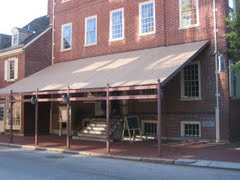 We stop at the City Tavern for dinner and I consider my own contributions, the contributions of my mother and my female friends. Women make great representatives in government, teachers, doctors, nurses, engineers, or company presidents…whatever a person is called to. But I believe the most awesome vocation is motherhood. Sometimes the impression is given that this is an inferior vocation because it revolves around endless days of hard work and little things.
We stop at the City Tavern for dinner and I consider my own contributions, the contributions of my mother and my female friends. Women make great representatives in government, teachers, doctors, nurses, engineers, or company presidents…whatever a person is called to. But I believe the most awesome vocation is motherhood. Sometimes the impression is given that this is an inferior vocation because it revolves around endless days of hard work and little things.
I am a stay-at-home, home-schooling mom. I don’t do anything big that will be recorded in history. But I do something important to the future by caring for my family and raising my boys the best I can. Love, sacrifices, hard work, encouragement, and counsel.
Little things can change the world!
Thanks for checking out my blog!
If you like what you see, leave a comment, share with a friend, check out my books, or sign up for my author newsletter!

